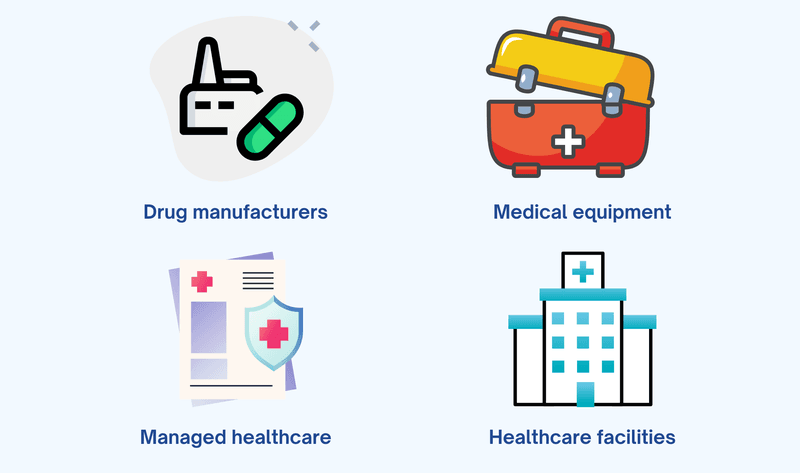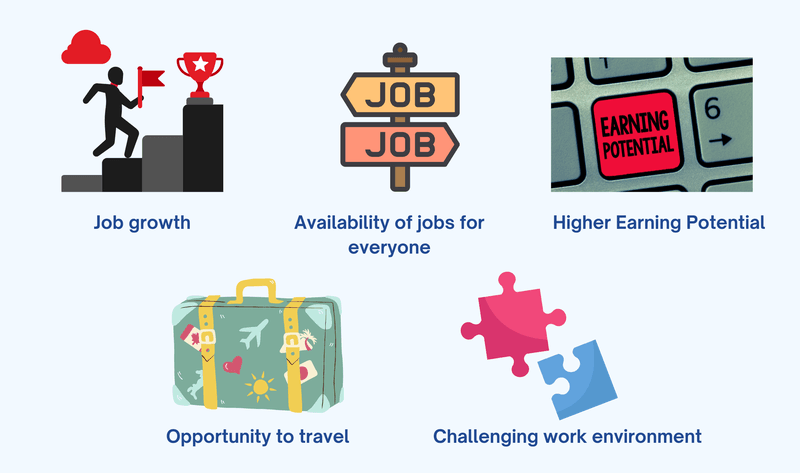Careers – These are something that determines the future trajectory of our lives. While changing your career stream is possible, choosing a job cannot be taken lightly. So, Totempool continues with popular good career path series. This article will discuss “Is healthcare a good career path?”
Yes, healthcare is a good career path. Health is one of the building blocks of life as people can live their lives to the fullest only if they are entirely healthy, which makes healthcare a crucial sector in the overall economy.
Key Takeaways
- The healthcare career is fulfilling, offers job security, and growth opportunities in various fields. Increasing demand for healthcare workers creates excellent advancement opportunities.
- Leading roles like physician or hospital administrator offer attractive salaries and benefits.
- Industries within the sector are: Drug manufacturers, medical equipment, managed healthcare, and healthcare facilities.
- Ethics are crucial in the sector. Healthcare professionals must share information with patients, maintain privacy, and respect their emotional needs. Professionals should prioritize patient safety, dignity, and autonomy.
- Salary can be high depending on the job. A physician's yearly income can start at $200,000.
- The mian resons to consider a career in healthcase are: Job growth, availability of jobs for everyone, higher earning potential, opportunity to travel, dynamic work environment.
Table of Contents:
- Is Healthcare A Good Career Path?
- What Is the Healthcare Industry?
- Industries Within Healthcare
- What Are The Career Options in Healthcare?
- Ethics and Etiquettes in Healthcare Career Path
- What Is Healthcare Administration?
- Reasons to Work in Healthcare
- What Are The Careers In Medical Devices?
- Is Healthcare A Good Career Path?
Is Healthcare A Good Career Path?
If you're considering a healthcare career, you may wonder if it's the right path. The answer is a resounding yes! Healthcare is a gratifying and fulfilling profession that offers excellent job security and tremendous opportunities for growth.
Working in healthcare can mean many things, from nursing to physical therapy and medical technology. No matter where your interests lie within the field, there are many reasons why healthcare makes an ideal career path. For starters, job satisfaction is higher than average in this sector because of the positive impact that health professionals make in their patient’s lives each day.
There are also excellent opportunities for advancement as the demand for healthcare workers increases due to rapid population growth and aging baby boomers who require more intensive care. With the proper qualifications and experience, individuals can pursue leading roles such as physician or hospital administrator with attractive salaries and benefits packages.
What Is the Healthcare Industry?
One of the first things that come to mind upon hearing the term healthcare is doctors and nurses.
Although these are essential roles in this field, this industry comprises much more than just doctors; some provide healthcare equipment and services. This area also includes individuals and organizations that offer training and education related to healthcare services.
Healthcare is an area that will remain in focus in the foreseeable future.
According to the US Bureau of Labour Statistics, healthcare services will have a booming decade, and an aging population and people with chronic health conditions will drive this demand.
What Are The Industries Within Healthcare?
There are a vast number of industries that fall under healthcare. Some of these are described below:

Drug Manufacturers
Companies that manufacture drugs can be broken down into pharma firms, biotechnology companies, and makers of generic medications.
Most of these companies manufacture well-known drugs, and they invest in research and development. Generic drug companies operate on thin margins, no longer protected by patents.
Medical Equipment
Medical equipment firms manufacture equipment such as operating tables, braces, and scalpels, examples of the standard equipment used. The equipment includes specialized equipment like mammograms, ventilators, X-ray machines, and MRI machines.
Managed Healthcare
Companies that provide health insurance services come under managed healthcare. Health insurance helps individuals pool risk, and the money goes to whoever needs it most.
Healthcare insurance in the USA is mainly of two types: public and private. Most people use a combination of both.
There are three US public health insurance available. They are Medicare, Medicaid, and the Children’s Health Insurance Program.
Amongst the private players, there are three types of health insurance. These are:
The standard fee for service health insurance plans is usually the most expensive but offers the highest flexibility.
Health Maintenance Organizations (HMOs) offer lower co-payments and cover preventive healthcare costs. The downside is that they offer fewer options for healthcare providers.
Preferred Provider Organizations are similar to HMOs but provide more flexibility while selecting a provider.
Healthcare Facilities
These firms run hospitals, clinics, labs, and other facilities that house patients short-term or long-term. These facilities could treat patients, run tests or care for them.
Reasons to Work in Healthcare

Job Growth
Healthcare is their sector if one seeks a career with surefire growth opportunities. As per the BLS, healthcare and social assistance are expected to add 3.3 million jobs between 2020-2030.
Moreover, advances in medicine will give newer opportunities in this sector.
Availability of jobs for everyone
Healthcare is a sector that has a large number of jobs available. So, irrespective of one’s qualification or experience, this sector has several avenues.
Higher Earning Potential
Due to this industry's nature, there is a higher demand for specialized professionals.
Entry-level jobs in healthcare have better compensation than other sectors. Also, the more skilled and trained a professional is, the higher his earning potential.
Opportunity to travel
As an experienced healthcare professional, one can become a visiting doctor in top hospitals worldwide.
Moreover, a person can visit several international conferences and stay updated with the latest developments in his field. One can also contribute to improving the lives of people in developing economies.
Dynamic Work Environment
Every day brings forth new challenges in patients, technologies, and regulations. This makes healthcare an ideal career choice for people looking for a dynamic work environment.
What Are The Career Options in Healthcare?

Given the diversity of healthcare fields, it is replete with career options. This is an important aspect to consider: Is healthcare a good career path?
Many people are a part of this sector, but their roles go unnoticed as they work behind the scenes. Let’s learn about the main job positions.
Ultrasound Technician
He maintains the ultrasound equipment, schedules patients' appointments, and performs the ultrasound examination. In addition, he sonograms images and videos and informs the doctors of any issues. On average, an ultrasound technician makes more than $66,000 a year.
Anesthesia Technician
He is responsible for supplying anesthesia carts and machines. Also, he works on disinfecting and disassembling anesthesia equipment and replacing old machines. This technician also prepares transducers for invasive thermodynamic monitoring. He makes $42,000 a year.
Lab Technician
A medical lab technician calibrates lab equipment and is responsible for cleaning it and maintaining its sterility.
Other job functions of a lab technician include collecting tissue samples from patients and preparing solutions or reagents to be combined with these samples. They make $45,000 a year.
Medical Laboratory Technologist
Medical laboratory technologists are responsible for performing various technical tasks in medical laboratories. These tasks may include running tests, collecting specimens, and preparing samples for analysis. Medical laboratory technologists may also develop and implement lab policies and procedures.
Medical laboratory technologists typically need a bachelor's degree in medical technology or a related field. They may also need certification in medical laboratory techniques from the American Society for Clinical Pathology or the American Medical Technologist Association. Many medical labs require technicians to have an accredited certification program as well.
Medical laboratory technologists typically work full-time in medical laboratories. They may also work part-time or freelance during periods of emergency or other high-demand periods. Medical laboratory technologists generally enjoy good working conditions and competitive salaries.
Radiology Technologist
Radiology technicians are responsible for the safe and accurate interpretation of x-ray images and other medical images. They use various medical imaging equipment to produce diagnostic images, including computed tomography (CT), magnetic resonance imaging (MRI), ultrasound, and digital radiography. Radiology technicians must have a valid certification in radiology technology from an accredited organization.
As the demand for radiology services continues to grow, so does the need for qualified and capable radiology technicians. A career as a radiology technician can offer excellent opportunities for advancement and growth, both in terms of salary and career opportunities. Those interested in pursuing a career as a radiology technician should consider obtaining certification from an accredited organization such as the American Registry of Radiologic Technologists (ARRT).
Healthcare Technician
Healthcare technicians are in high demand in the current job market. With an ever-growing population, more people require medical attention. This means there is a greater need for technicians who can administer medical treatments and ensure patients are comfortable.
Healthcare technicians may work in various settings, including hospitals, clinics, and private practices. They typically need an associate's degree or certification to qualify for most positions. Some healthcare technicians may also have experience working with computers and other medical equipment.
Nutritionists
They advise people on healthy eating habits and nutrition issues. They optimize diets and prepare customized plans for individuals. Additionally, they conduct sessions and programs on nutrition, diet, and lifestyle, which help people lead healthy lives. Nutritionists make around $54000 a year.
Occupational Therapist
An occupational therapist treats ill or disabled patients. He charts treatment plans and suggests exercises that help people lead independent lives by focusing on activities of daily living. They help these people recover quickly and thoroughly by providing guidance and support during rehabilitation. Occupational Therapists may also train other workers in the workplace, helping to ensure a safe and healthy environment. An occupational therapist earns more than $80,000 a year.
Dentist
Dentists are trained professionals who care for a person’s mouth and teeth. They use various medical equipment such as X-rays, drills, and lasers to perform medical procedures.
Some of their responsibilities include- filling cavities, removing build-up from teeth, checking the growth of teeth, and putting in braces and dentures. Dentists earn more than $165,000 a year on average.
Nurse
Nurses are an essential part of the entire medical ecosystem. They are entrusted with several critical tasks, such as checking the patient's vital signs, communicating with doctors, and administering medicine. Nurses earn around $65,000 per annum on average.
Nuclear Medicine Technologist
The nuclear medicine technologist is a healthcare professional who uses imaging technology to diagnose and treat medical conditions. Nuclear medicine technology produces images of body organs and tissues using radioactive materials.
The nuclear medicine technologist must have a degree in medical science or a related field and experience in imaging technology. They work in hospitals, clinics, and other healthcare facilities.
Physician
Physicians provide medical health care to patients. They diagnose a person’s condition and prescribe the necessary tests and medication. They are also responsible for educating the patient on his medical condition apart from preventive care. Additionally, they have the following responsibilities:
- Recording a patient’s medical history.
- Prescribing tests and reviewing their results.
- Suggesting a plan of treatment
- Addressing a patient’s queries and allaying his fears if need be.
Ethics and Etiquettes in Healthcare Career

Patients expect healthcare professionals to be open and share details about their condition with them, and this helps patients make well-informed decisions about their future course of action. Therefore, ethics and etiquette are central to healthcare.
Moreover, patients expect doctors to maintain the privacy and confidentiality of their medical condition.
This is a two-way street; healthcare professionals expect their patients to be forthcoming and direct about their medical history.
Patients reach out to healthcare professionals when they are under some form of physical or mental distress. Therefore, healthcare professionals must be sensitive to their social and emotional needs.
A healthcare professional must treat everyone he meets with respect. This applies to the patient's family members and other loved ones. However, the patient's family should not hassle the doctor and let him go about his job.
The code of ethics that doctors should abide by can be summarized in the following points:
- The patient’s health, safety, and interests should be their priority
- Protect the dignity and autonomy of the patient
- Maintain confidentiality
- Practice with honesty and integrity
- Maintain professionalism and competence while dealing with patients
- Treat all patients in a non-discriminatory and equal fashion
- Respect colleagues, hospital staff, and others.
A physician makes about 200,000$ every year.
Summarizing – Is Healthcare A Good Career Path?
A person should pursue a career in healthcare as it is a high-impact industry, and one gets to touch people's lives directly and witness tangible outcomes.
As a result, they tend to experience higher motivation and job satisfaction.
Secondly, healthcare is a vast field that offers many diverse areas to work in. A person can work in different capacities before deciding on a specialization.
Despite healthcare's vast array of great career choices, it is not everyone’s cup of tea. One must conduct due diligence and determine whether a healthcare career aligns with their skills, needs, or interests.
A person must also remember that it is impossible to save everyone, however hard he tries. One must possess a high level of emotional stability as an individual, and this is because you get to witness miracles and tragedies regularly.
However, the immense satisfaction of contributing to the well-being of society makes it worth the roller coaster ride.
Now you know all about the career path in Health Care, you must do your calculations and make a fair decision keeping your interest in mind. Best of luck!
If you want to know more about other career paths, check out this list on Totempool. You can make your choices with solid information before moving to a particular industry.
As more industries are published on the website, we will keep updating the list for you. If you want to learn how to choose your career path, check out this article.

Ranu Kumari is a Professional Writer and a Marketing enthusiast who currently runs her own Marketing Consultancy, LatitudeBOX. She has written promotional articles for multiple brands and has published her work in Scopus indexed journals. She is passionate about expressing her thoughts and ideas to connect with her readers in a voice that they understand.
